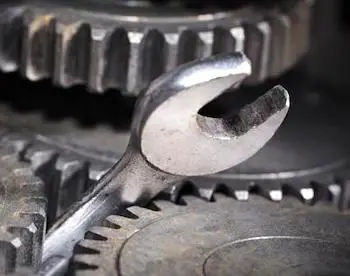To throw a spanner in the works is to, deliberately or otherwise, cause disruption; to interfere with the smooth running of something.
Throw a spanner in the works
What's the meaning of the phrase 'Throw a spanner in the works'?
What's the origin of the phrase 'Throw a spanner in the works'?
‘Throw (or put) a spanner in the works’ refers to the calamitous effects of throwing a spanner into the gears and pistons of an engine.
The expression comes in a variety of forms – ‘put/throw a spanner in the works/wheels/gears’. There is even a ‘throw a monkey wrench in the works’ variant in the USA. The ‘throw a spanner in the works’ variation is the one most commonly used.
This phrase appears to be something of a linguistic rarity – a commonly used English phrase that was coined in New Zealand.
The first record of the phrase that I can find in print is in The Parliamentary Debates of the New Zealand Parliament, 1932:
“Of course, every honourable member has a right to express his opinions, even of a critical nature, but I do think we should expect them to help and not throw a spanner in the gears.”
That doesn’t use the ‘spanner in the works’ form which is now more common but it is clearly essentially the same expression.
Given the date and the location, it may be that the NZ speaker above was referring to, or at least influenced by, a tale from Whangamomona, which is a township on New Zealand’s North Island. There’s a plaque displayed at the site of what claims to be the oldest oil well in the world. This is what it says:
This is the site of the World’s First Oil Well drilled here in 1828. Legend has it that Mr Ewen McGregor set up the derrick and drilled a hole 700 feet deep. All was going well and signs of an oil strike were imminent when his son Jethro dropped a spanner down the hole. From this incident the term, ‘A spanner in the works’, originated, and is now known world-wide. The spanner was not retrievable and so another hole was drilled, this time to 1200 feet, where gas was struck. Alas Ewen’s other son Cletus fell into this hole, and ended all prospecting on the site.
Whether any of that is true, or whether the site is the world’s first oil well, is open to debate. However, the use of ‘throw a spanner in the gears’ in the same country just four years later isn’t in doubt.
That seems pretty strong circumstantial evidence to place the origin of the phrase in New Zealand in 1828.
The earliest use of ‘throw a spanner in the works’ that I can find in print is in P. G. Wodehouse’s Right Ho, Jeeves, 1934:
“He should have had sense enough to see that he was throwing a spanner into the works.”
The expression didn’t spread quickly to the USA, where it is still not widely used,, even in the ‘monkey wrench’ form.
John Lennon used a play on this expression in his book A Spaniard in the Works.
Like most of us growing up in Britain in the 1950s, Lennon was a fan of ‘Professor’ Stanley Unwin – a comic turn who spoke in a stream of inspired Spooneristic gobbledegook. The title owes much to Unwin’s influence.
Related phrases and meanings
Browse more Phrases
About the Author

Phrases & Meanings
A-Z
A B C D E F G H I J K L M N O P Q R S T UV W XYZ
Categories
American Animals Australian Bible Body Colour Conflict Death Devil Dogs Emotions Euphemism Family Fashion Food French Horses ‘Jack’ Luck Money Military Music Names Nature Nautical Numbers Politics Religion Shakespeare Stupidity Entertainment Weather Women Work
How did we do?
Have you spotted something that needs updated on this page? We review all feedback we receive to ensure that we provide the most accurate and up to date information on phrases.
